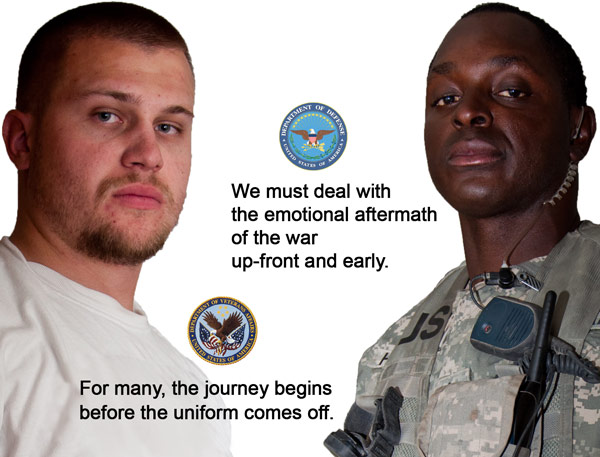 Joe read the Go Army ads and enlisted. He’s a good guy. Not Harvard or Stanford material, but a hard worker, a guy who knows that courage is acting in spite of fear. He was also thinking about the post-deployment perks when he signed the papers.
Joe read the Go Army ads and enlisted. He’s a good guy. Not Harvard or Stanford material, but a hard worker, a guy who knows that courage is acting in spite of fear. He was also thinking about the post-deployment perks when he signed the papers.
So he goes through kick-butt training, gets deployed, gets knocked down, and two years later comes home with PTSD and mild traumatic brain injury.
Now, he can’t concentrate well. He has poor working memory and his processing speed is reduced. He wasn’t great with reading and learning, and now he’s in worse condition. He’s embarrassed, frustrated and angry – but he’s street-wise enough not to look stupid. So he quits a re-training program. Not that he really wants to – it’s just what makes the most sense. It also makes sense that many of his problems started after he took off his uniform. Now, depression is added to his caldron of anger and frustration. And his next likely step is to end it all.
But in a dark moment, he remembers something he saw inscribed on the archway of an old crumbing building in his hometown, “Know the truth, and the truth shall make you free.”
And he realizes something haunting: All of his problems aren’t because of the military. He had issues before he enlisted – some are worse now. Others are new or compounded. For all of them, he makes a decision and chooses to believe that the truth will mean hope and a better life.
We use Emotive Storytelling to get to the heart of issues. For example, we know that memories can be deceiving. Elizabeth Loftus at UC Irvine has done a lot of outstanding and controversial research in that area as written in Our changeable memories: legal and practical implications. Watch her show how a recent memory can contaminate a past memory. We use these concepts to help build a deeper level of truth into prevention, deployment and post-deployment resilience programs.
Joe won’t read this blog, but maybe someone with a mandate to help vets will.










This blog moves me on several levels: knowledge of the deeper side of human nature – the confluence of unintended false memories with horrific true memories; the stories associated with the quote about the truth and freedom; and curiosity about stories changing vets. Could you please elaborate on how on this literally happens? Thanks.
I’m disgusted! This sounds like the military trying to pawn off their responsibility for inculcating young men to kill their fellow human beings and then not supporting veterans to readjust to normal life. I’m revolted at your suggestion of false memories playing a strong role in the maladjustment issues of veterans.